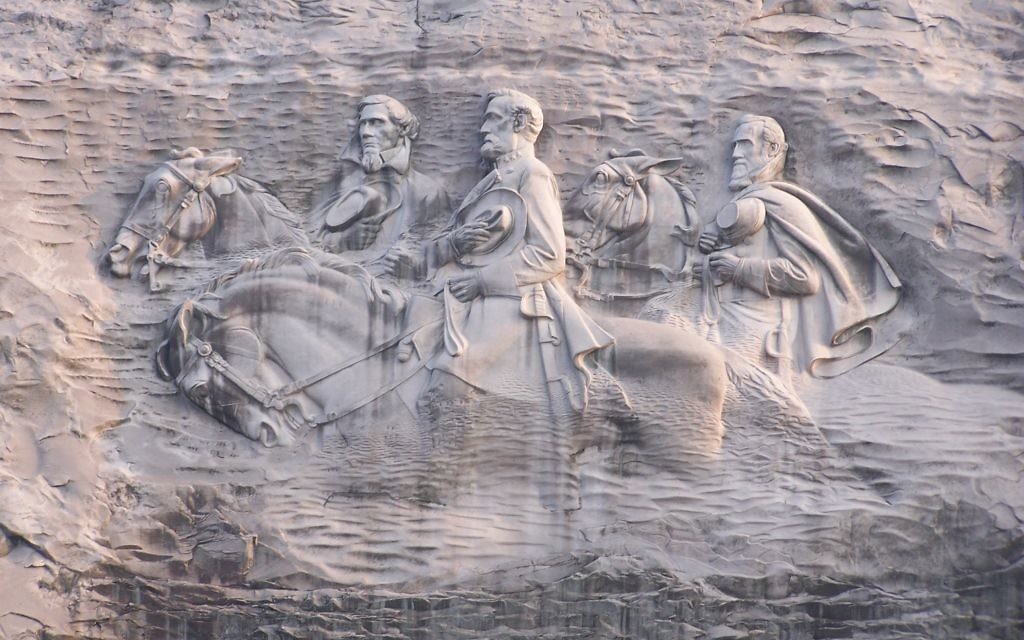What Should We Do About Our History?
The South lost the Civil War. The Nazis killed 6 million Jews. And still nothing is simple.
I’ve told this story before in this space, but it merits retelling:
Not long after we moved here 30 summers ago, my mother came to visit. Seeking to show her something Southern, we drove to Stone Mountain and rode the train around the park, listening to a recording about the massive bas relief that depicts heroes of the Confederacy.
During the narration, my mother, an Iowa native with an Ivy League master’s degree in history, asked me, in a conversational tone of voice, “Don’t these people know they lost that war?”
Get The AJT Newsletter by email and never miss our top stories Free Sign Up
I replied that, based on my then-brief exposure to the region, some doubt remained on that question.
So, what should we do about our history?
We live in a community where thousands of motorists daily cruise by the spot where, 102 years ago, in August 1915, a Jew was lynched in what then was a Marietta woods.
A historical marker near the site was removed to make way for the expansion of Interstate 75 and will remain in a warehouse until the road project is completed and a new location is chosen. Two other plaques referencing this miscarriage of justice, removed before a nearby building was torn down, sit on the floor of a rabbi’s office.
Some of the men who tied that noose around Leo Frank’s neck, threw the rope over a tree, kicked out the table under his feet and allowed his body to hang long enough for people to take photographs that were sold as souvenirs burned a cross atop Stone Mountain three months later and declared themselves the reconstituted Ku Klux Klan.
Their ideological descendants and others drawn to a warped philosophy that, as a matter of government policy, killed some 11 million people — including 6 million Jews, many of their bodies burned in crematoria, the stench wafting into the homes of local townspeople — bear the responsibility for precipitating recent events in Charlottesville, Va.
They carried flags bearing swastikas, a symbol that once meant something else but a century ago was appropriated by those whose deeds would be so horrifying that the word “genocide” had to be created, and the Confederate battle flag, a symbol that has come to be associated less with heritage than with the terror wreaked by men so brave that they cloaked themselves in white sheets.
With polo shirts and khakis their dominant costume, and carrying tiki torches commonly used for backyard picnics (leaving the other hand free for Nazi salutes), the white supremacists’ Friday night march to the statue of Confederate Gen. Robert E. Lee, around whom considerable myth has formed, resembled a cross between a fraternity alumni parade and a wannabe Nuremberg rally, albeit recorded by mobile phones rather than the cameras of Leni Riefenstahl.
No one should minimize the anti-Jewish theme advertised by organizers of this gathering of the “alt-right,” a too-polite term for neo-Nazis, white supremacists and other varieties of bigot.
A short walk from where the mob chanted “Jews will not replace us,” Congregation Beth Israel was holding services. The Reform congregation hired an armed guard to provide security Friday night and Saturday morning. At one point, self-proclaimed patriots toting semiautomatic rifles stood menacingly outside the synagogue. Threats to burn the building were taken seriously enough to warrant removal of a Holocaust Torah scroll for safekeeping. A congregant is among those recovering from wounds suffered when an avowed neo-Nazi drove a car into counter-demonstrators, killing one woman and injuring 19 people.
(Full disclosure: CBI’s rabbi educator is married to my nephew. The role she played throughout these events is a source of familial pride.)
Beth Israel is accepting donations to help defray the cost of its added security and to use in its social justice programs.
Just as Charlottesville confronted its history, so are Stone Mountain, Atlanta, Decatur and other cities and towns in Georgia and throughout the South, where stand monuments to a failed cause, one that defended the right of one man to own another as chattel.
There are no easy answers, contrary to what the neo-Nazis or the militant anti-fascist groups believe. Do you remove those monuments or leave them as tools to teach about the evils associated with their history?
Sometimes we do not recognize the history we pass every day. Other times, history stares us in the face and asks, “What are you going to do?”





comments